 Welcome to Issue 95 of the SUPERIOR BOOK PRODUCTIONS newsletter!
Welcome to Issue 95 of the SUPERIOR BOOK PRODUCTIONS newsletter!
Happy Holidays, Everyone!
It’s hard to believe 2022 is almost over, but for the book world, it ends with a bang since the holiday shopping season is often the time when the most books get bought. I have always had books under the Christmas tree to open since I was a kid, books are always the primary thing on my Christmas list, and I love to give books as gifts more than anything else. Whatever holiday you are celebrating at this time of year, or if you just want something to cuddle up with on a warm winter night, this issue of the Superior Book Productions newsletter has a plethora of wonderful titles to choose from. In fact, this is a double issue since we have twice as many books as usual.
And if you live in Upper Michigan, you can come visit me at the TV6 Christmas Craft Show at the Superior Dome in Marquette once again where I will be selling and autographing my own books. This year’s dates and times are:
- Fri., Dec. 2, 5 to 9 p.m.
- Sat., Dec 3, 10 a.m. to 6 p.m.
- Sun., Dec 4, 11 a.m. to 4 p.m.
Have a wonderful holiday season, make a New Year’s resolution to read some great books, and we’ll see you in 2023!
Tyler Tichelaar
This Month’s Great Book Quote:
“Books make great gifts because they have whole worlds inside of them.”
— Neil Gaiman
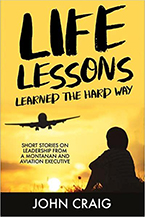 John Craig, a former Boeing executive, has had numerous meaningful life experiences from growing up in Montana to being a father and husband and working at Boeing. Now in his new book Life Lessons Learned the Hard Way: Short Stories on Leadership from a Montanan and Aviation Executive, he shares those lessons with readers so they can benefit from his wisdom and hopefully save themselves from some hard lessons themselves. While the book covers a wide range of stories, each one provides both entertainment and some simple education about the topic that any reader will find interesting and helpful.
John Craig, a former Boeing executive, has had numerous meaningful life experiences from growing up in Montana to being a father and husband and working at Boeing. Now in his new book Life Lessons Learned the Hard Way: Short Stories on Leadership from a Montanan and Aviation Executive, he shares those lessons with readers so they can benefit from his wisdom and hopefully save themselves from some hard lessons themselves. While the book covers a wide range of stories, each one provides both entertainment and some simple education about the topic that any reader will find interesting and helpful.
At the heart of the book is the topic of leadership, although it might be simplified to “how to get along with others.” Craig has experience traveling the world and getting to know people from different cultures. He has met with government leaders and spoken at industry forums. He has managed employees, and he has raised children. Through it all, he has learned that simple things like listening and showing respect to people will help you get along with them and get them to be open to your own perspective.
Some of what Craig has learned has truly been learned the hard way, as is common for many young people. In his early years of driving, he liked to speed and got pulled over more than once.
To read more, visit Life Lessons Learned the Hard Way.
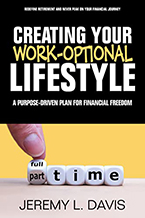 Financial planner Jeremy L. Davis’ new book Creating Your Work-Optional Lifestyle: A Purpose-Driven Plan for Financial Freedom provides readers with an action plan for achieving a lifestyle of freedom.
Financial planner Jeremy L. Davis’ new book Creating Your Work-Optional Lifestyle: A Purpose-Driven Plan for Financial Freedom provides readers with an action plan for achieving a lifestyle of freedom.
Early in life, Jeremy was inspired by his father, who told him, “Retirement is not for me; it’s a concept that will never be for me. I love what I’m doing, and I intend to keep doing it for my entire life.” Jeremy was inspired by this statement to seek work he would enjoy and to create a lifestyle that would allow him to work when he chose. Ultimately, he became a financial advisor, and for nearly twenty years, he has been helping others achieve a work-optional lifestyle just like he has.
In Creating Your Work-Optional Lifestyle, Jeremy shares the plan and process he has developed to help his clients reshape their concepts of retirement. Early in the book, he defines just what this lifestyle entails: “A work-optional lifestyle gives you the flexibility to work on your interests and to apply your effort to endeavors that give life meaning. A work-optional lifestyle isn’t a license to sit on the beach and drink Mai-Tais while watching the waves crash.”
To read more, visit Creating Your Work-Optional Lifestyle.
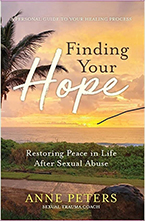 In Finding Your Hope: Restoring Peace in Life After Sexual Abuse, Anne Peters shares advice and processes for overcoming sexual abuse so you can live a normal and happy life. Peters, herself a victim of sexual abuse, tells her own story and that of others to inspire readers to know that a better life exists and that the pain of sexual abuse can be healed.
In Finding Your Hope: Restoring Peace in Life After Sexual Abuse, Anne Peters shares advice and processes for overcoming sexual abuse so you can live a normal and happy life. Peters, herself a victim of sexual abuse, tells her own story and that of others to inspire readers to know that a better life exists and that the pain of sexual abuse can be healed.
Peters offers a healing plan that is presented in the book in fifteen chapters, each chapter a step of that plan. Topics or steps include: Understanding What Happened to You, Locating Helpful Resources, Knowing It Is Not Your Fault, Embracing Your Inner Child, Releasing Your Emotions, and Achieving Happiness. The chapters are short to make them easier to read and also because Peters knows this process can feel scary and overwhelming, so she wants readers to bite off a little at a time so they feel comfortable and can cope with any emotions that come up during the process. She lets readers know they should work at their own pace and can skip around in the chapters, reread them as needed, and do the exercises offered at the end of each chapter on their own timeline.
To read more, visit Finding Your Hope.
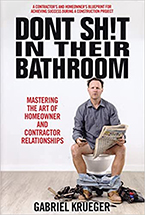 Gabriel Krueger, aka “Gabe, The General Contractor,” has long known there are things that go unsaid when contractors and homeowners work together. After more than ten years as a contractor and nearly a quarter of a century in construction, he has a long list of items that need to be talked about, but rarely are, if a home improvement project is going to go smoothly. His new book Don’t Sh!t in Their Bathroom: Mastering the Art of Homeowner and Contractor Relationships discusses precisely the types of conversations that need to happen but rarely do. In these pages, Gabe talks about the need to set boundaries, create clear contracts, and simply communicate with each other so everyone is clear about what needs to be done on a project. Then, the workers can get the work done efficiently and properly, and the homeowners can have as little disruption in their lives as possible.
Gabriel Krueger, aka “Gabe, The General Contractor,” has long known there are things that go unsaid when contractors and homeowners work together. After more than ten years as a contractor and nearly a quarter of a century in construction, he has a long list of items that need to be talked about, but rarely are, if a home improvement project is going to go smoothly. His new book Don’t Sh!t in Their Bathroom: Mastering the Art of Homeowner and Contractor Relationships discusses precisely the types of conversations that need to happen but rarely do. In these pages, Gabe talks about the need to set boundaries, create clear contracts, and simply communicate with each other so everyone is clear about what needs to be done on a project. Then, the workers can get the work done efficiently and properly, and the homeowners can have as little disruption in their lives as possible.
While bathroom humor may not be to everyone’s taste, the title references a situation that happens too often where workers are left wondering when to use a bathroom. It is just one of many issues that arise during a construction project—where to smoke and where to park are a few others—and Gabe has the answer to resolving all such situations, big and small.
To read more, visit Don’t Sh!t in Their Bathroom.
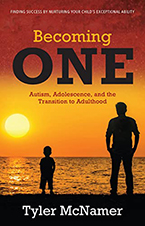 Tyler McNamer describes himself as follows: “I am not an autistic writer; I’m just a writer who has autism. I don’t go around being openly autistic; I’m just someone trying to figure himself out. That’s why I have written a couple of books about having autism. Time to continue the adventure!” His first book, Population: One, became a bestseller because of his eye-opening perspective about growing up with autism. Now, in his second book, Becoming One: Autism, Adolescence, and the Transition to Adulthood, Tyler continues his story, beginning with his graduation from high school. He shares how he has transitioned into adulthood from getting a first job as a maintenance worker at a bookstore to learning how to promote his first book and become a public speaker.
Tyler McNamer describes himself as follows: “I am not an autistic writer; I’m just a writer who has autism. I don’t go around being openly autistic; I’m just someone trying to figure himself out. That’s why I have written a couple of books about having autism. Time to continue the adventure!” His first book, Population: One, became a bestseller because of his eye-opening perspective about growing up with autism. Now, in his second book, Becoming One: Autism, Adolescence, and the Transition to Adulthood, Tyler continues his story, beginning with his graduation from high school. He shares how he has transitioned into adulthood from getting a first job as a maintenance worker at a bookstore to learning how to promote his first book and become a public speaker.
Readers of Population One may be surprised by how this second book is both similar and different to the first. Even Tyler admits he is surprised by some of the things he said in his first book because his perspective has changed. But that is because he is an evolving human being. In fact, his first book was written as much to help him figure out autism and himself as it was for his readers.
To read more, visit Becoming One.
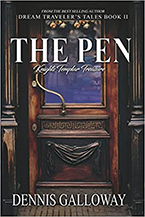 Dennis Galloway’s new novel The Pen: Knights Templar Treasure, Dream Traveler’s Tales Book II continues The Dream Traveler’s Tales series as we meet yet another person who finds an antique pen with a mind of its own. In the first book, a pen was found in turn-of-the-century Edinburgh by a clerk named Harold, who soon found himself visiting the deserts of Arabia vicariously through the pen. In this second book, the story begins in Edinburgh during World War II when a young woman, Katherine, who works in a laundry but loves to write, buys an old pen at an antique store, little suspecting the adventure it will lead her on.
Dennis Galloway’s new novel The Pen: Knights Templar Treasure, Dream Traveler’s Tales Book II continues The Dream Traveler’s Tales series as we meet yet another person who finds an antique pen with a mind of its own. In the first book, a pen was found in turn-of-the-century Edinburgh by a clerk named Harold, who soon found himself visiting the deserts of Arabia vicariously through the pen. In this second book, the story begins in Edinburgh during World War II when a young woman, Katherine, who works in a laundry but loves to write, buys an old pen at an antique store, little suspecting the adventure it will lead her on.
Katherine’s life is not easy. The Germans are bombing Edinburgh. She barely makes enough to live on and pay the rent, and she struggles to feed herself and her two daughters. Eventually, Katherine is forced to send her children to the country to live with strangers where they will be safer. To pass the time, she indulges in her love of writing, but her antique pen has its own ideas. Katherine soon finds herself compelled to write in a strange language she doesn’t recognize.
To read more, visit The Pen II.
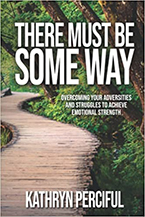 Kathryn Perciful knows what it is to overcome adversity, whether it be stuttering as a child or coping with Parkinson’s disease in her seventies. In There Must Be Some Way: How to Overcome Life’s Adversities and Struggles to Achieve Emotional Strength, Kathy tells her story in an engaging and entertaining way, while sharing her hard-won insights into life’s struggles and, ultimately, its joys.
Kathryn Perciful knows what it is to overcome adversity, whether it be stuttering as a child or coping with Parkinson’s disease in her seventies. In There Must Be Some Way: How to Overcome Life’s Adversities and Struggles to Achieve Emotional Strength, Kathy tells her story in an engaging and entertaining way, while sharing her hard-won insights into life’s struggles and, ultimately, its joys.
Now in her seventies, Kathy has experienced terrible lows and terrific highs. Those lows, which most would see as adversities, she has chosen repeatedly to see as opportunities, leading to her coining the term adversitunities. By turning those adversities into opportunities, she also ended up reaching many of her highs, and she’s had some wonderful highs, including running successful businesses, becoming a respected Toastmasters speaker, and enjoying twenty years of marriage to jazz legend Jack Perciful.
In There Must Be Some Way, Kathy tells her life story chronologically, highlighting the various adversities she has overcome, beginning with her profound stuttering as a child that often made her an outcast among other children and which hindered her career, placing her in invisible roles when she entered the business world. Later adversities she faced included a bad marriage, debt incurred from her ex-husband, business setbacks she had to turn around, the loss of her second beloved husband, and her recent illness.
To read more, visit There Must Be Some Way.
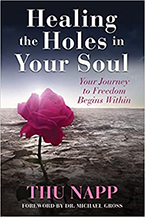 Tiiu Napp’s new book Healing the Holes in Your Soul: Your Journey to Freedom Begins Within is one woman’s introspective look at her past, how it shaped her, and ultimately, how she learned to heal from it. Tiiu was born in Canada to Estonian immigrant parents who had migrated there in the wake of World War II. Their paranoia that the Soviets might be out to find them, and their Old World ways, created a restrictive environment for Tiiu that she eventually rebelled against, leaving home at a young age while looking to the wrong men to protect her.
Tiiu Napp’s new book Healing the Holes in Your Soul: Your Journey to Freedom Begins Within is one woman’s introspective look at her past, how it shaped her, and ultimately, how she learned to heal from it. Tiiu was born in Canada to Estonian immigrant parents who had migrated there in the wake of World War II. Their paranoia that the Soviets might be out to find them, and their Old World ways, created a restrictive environment for Tiiu that she eventually rebelled against, leaving home at a young age while looking to the wrong men to protect her.
Far more than a memoir, Tiiu’s story takes us on a healing journey that asks the reader to reflect on their own life choices to better understand their past and heal from it. Each chapter ends with questions that allow the reader to reflect upon what they read and how it applies to their own life. An additional bonus is a foreword by Dr. Michael Gross, author of The Spiritual Primer and a close friend of Tiiu’s, who has helped her understand herself better from a spiritual level and heal her past.
Without being taught by her parents how to make good decisions, Tiiu soon found herself letting others dictate her life experiences.
To read more, visit Healing the Holes in Your Soul.
 Amira Sabree’s new book Not Love: The Road Back Home is a poignant collection of essays and poems about the search for love, looking for love in the wrong places, and the power of self-love.
Amira Sabree’s new book Not Love: The Road Back Home is a poignant collection of essays and poems about the search for love, looking for love in the wrong places, and the power of self-love.
Amira writes about her personal life, changing lovers’ names, but revealing details of relationships with men who for various reasons were unable to be the men she needed them to be. She sheds insight also into her own role in these relationships. The book opens with an essay titled “Not Enough” in which she shares an early childhood memory of being made to feel like she was not good enough. Unbeknownst to her, that feeling would prove to be a roadblock in several adult relationships.
Amira does not write to slam the men in her life. She does not write to express that she feels less than deserving of love. She writes to share how she learned what love was not in her quest to find love. In the book’s introduction she asserts:
“I wrote this book to save myself.... I wanted to understand my relationship with love. I wanted to understand how, where, and when I created my definition. I wanted to understand how life experiences shaped the ways in which I perceived, received, and gave love....”
To read more, visit Not Love.
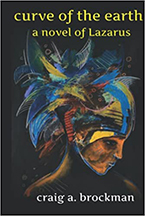 In Curve of the Earth, Craig A. Brockman answers the question of what happened to Lazarus after the gospels. Because of Lazarus’ miraculous resurrection at the hand of Christ, he may have no longer been subject to the same rules of death that the rest of humanity is, and that situation, as played out in the pages of this novel, makes for fascinating reading.
In Curve of the Earth, Craig A. Brockman answers the question of what happened to Lazarus after the gospels. Because of Lazarus’ miraculous resurrection at the hand of Christ, he may have no longer been subject to the same rules of death that the rest of humanity is, and that situation, as played out in the pages of this novel, makes for fascinating reading.
A blend of historical fiction, adventure, and deep questions about the meaning of life, Curve of the Earth is biblical fiction at its best, raising theological ponderings while showing the effects of religious belief or lack thereof upon its characters.
The novel opens with Lazarus’ memories of what he experienced during the brief time he was dead. While his body lay in the tomb, his spirit found itself in a beautiful and limitless garden-like landscape. He describes his time there, but continually questions the experience and what it means.
Then as the years go on, Lazarus finds himself drifting away from the other believers in Christ, partly precipitated by the discomfort he feels because he is not aging and others are beginning to notice. The result is an often tumultuous life, one filled with wanderings about the Mediterranean and Europe over the course of centuries.
To read more, visit Curve of the Earth.
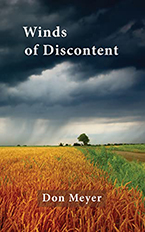 Winds of Discontent is the latest historical novel from the pen of Don Meyer, an author known for writing about war and its effects upon the people who get caught up in it. This time Meyer focuses on the events that led to the Vietnam War.
Winds of Discontent is the latest historical novel from the pen of Don Meyer, an author known for writing about war and its effects upon the people who get caught up in it. This time Meyer focuses on the events that led to the Vietnam War.
The story begins soon after World War II when nineteen-year-old Sinclair Langdon, who is British, arrives in Vietnam on a ship after running away from home. Sinclair’s father is in the military and has now been stationed in China, but Sinclair is tired of military life, so he has taken passage on the first ship possible, not caring where it is destined. Once he arrives in Hanoi, Vietnam, he needs money. He soon meets Frenchy, a Frenchman who is delivering machine parts and needs assistance, so Sinclair agrees to the job. It doesn’t take long for Sinclair to realize Frenchy is actually smuggling weapons to the Vietnamese rebels who are fighting the French who occupy their homeland. Since he needs the money, Sinclair doesn’t shy away from the danger or adventure.
Sinclair also meets Edward Bourke, a British reporter who enlists him as a resource to supply him with information for his news reports regarding the rebels. Now Sinclair has two jobs and it looks like he’s destined to stay in Vietnam.
To read more, visit Winds of Discontent.
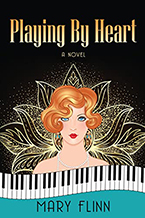 Mary Flinn’s new novel Playing by Heart is a standalone work that is also a sequel to her previous novel LUMINA. It juxtaposes modern-day characters living through the pandemic in Wilmington, North Carolina, with a story set in the late 1920s.
Mary Flinn’s new novel Playing by Heart is a standalone work that is also a sequel to her previous novel LUMINA. It juxtaposes modern-day characters living through the pandemic in Wilmington, North Carolina, with a story set in the late 1920s.
In modern-day Wilmington, Anne Borden (AB) Montgomery, a just-turned eighty independent woman, decides to search her attic for more of her mother Sylvie Meeks’ diaries as reading material to entertain her and her friends in the early days of the coronavirus pandemic. AB has been looking after her longtime friend, Bernie May, also eighty, who has been dealing with a personal illness. Their neighbors, Elle and Nate, are a young couple in their thirties planning to get married until the pandemic disrupts their lives. The four of them come together on AB’s porch, properly social distanced, or via Zoom, to read Sylvie’s diaries and continue the story of her romance and life in Wilmington and now at Oberlin College in Ohio that they had previously begun reading.
Flinn does a superb job of keeping the suspense going by switching back and forth between the two time periods and showing how the modern characters react to Sylvie and her friends’ predicaments.
To read more, visit Playing by Heart.
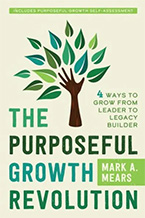 Mark Mears’ new book The Purposeful Growth Revolution: 4 Ways to Grow from Leader to Legacy Builder offers a simple concept of growth and the seasons to act as a springboard to spring into a life of growth, change, and leadership.
Mark Mears’ new book The Purposeful Growth Revolution: 4 Ways to Grow from Leader to Legacy Builder offers a simple concept of growth and the seasons to act as a springboard to spring into a life of growth, change, and leadership.
Mears begins by describing a magical moment in his life when he woke to admire a leaf on a tree and suddenly realized a leaf was a metaphor for growth and rebirth. He turned LEAF into an acronym for Leadership, Engagement, Accountability, and Fulfillment—four simple, yet powerful and integrated growth processes, which he explores in this book to demonstrate how we can all achieve purposeful growth that will make the world a better place.
Mears is no stranger to leadership or growth. He has had an impressive business career of thirty-five-plus years, working for such companies as PepsiCo/Pizza Hut, McDonald’s, Frito-Lay, JCPenney, NBCUniversal, and The Cheesecake Factory. He’s held positions ranging from assistant account executive to president and chief executive officer. Throughout the book, he shares stories of how he experienced personal growth and how he encouraged growth in others both individually and as teams in the organizations where he worked. He continually supports his statements with research from scholars and scientists, but he keeps the book highly readable and personal to show how the subject matter relates to his own personal experiences and successes.
To read more, visit The Purposeful Growth Revolution.
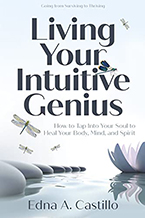 Edna Castillo has written a dynamic new book that teaches us all to look inside ourselves for the answers we need. Living Your Intuitive Genius: How to Tap Into Your Soul to Heal Your Body, Mind, and Spirit lives up to its title’s promises. And it is able to do that because Edna has applied the principles she teaches to her own life, as best manifested in her journey with breast cancer. Early in the book, Edna discusses how she found answers by saying:
Edna Castillo has written a dynamic new book that teaches us all to look inside ourselves for the answers we need. Living Your Intuitive Genius: How to Tap Into Your Soul to Heal Your Body, Mind, and Spirit lives up to its title’s promises. And it is able to do that because Edna has applied the principles she teaches to her own life, as best manifested in her journey with breast cancer. Early in the book, Edna discusses how she found answers by saying:
“If you are asking why you are living with a health condition, I say let go of the why, and at the same time, ask your Source to send you the answer. We don’t have to find the why—the mystery is part of the gift—but in some cases, the answer may be helpful. This is what happened to me. I understood how powerful my thoughts are; the breast cancer diagnosis was evidence of the power of my mind. And it has now allowed me to experiment more with other aspects of my thoughts. Keeping my thoughts reined in and trusting the process of life has become my primary mode of operation.”
Edna believes she both indirectly caused her breast cancer and intentionally healed it.
To read more, visit Living Your Intuitive Genius.

